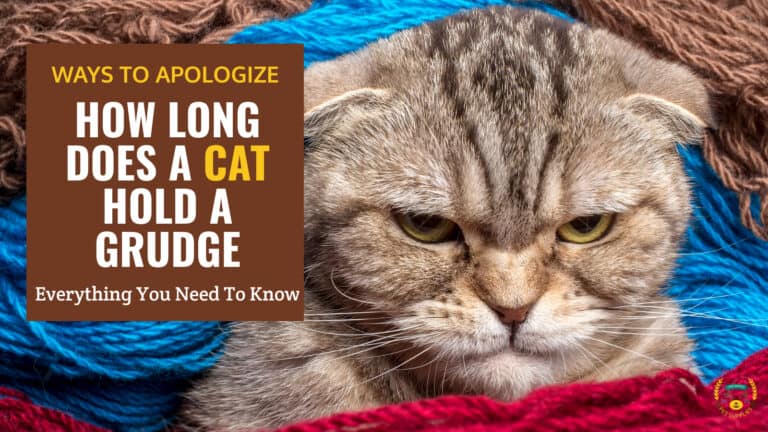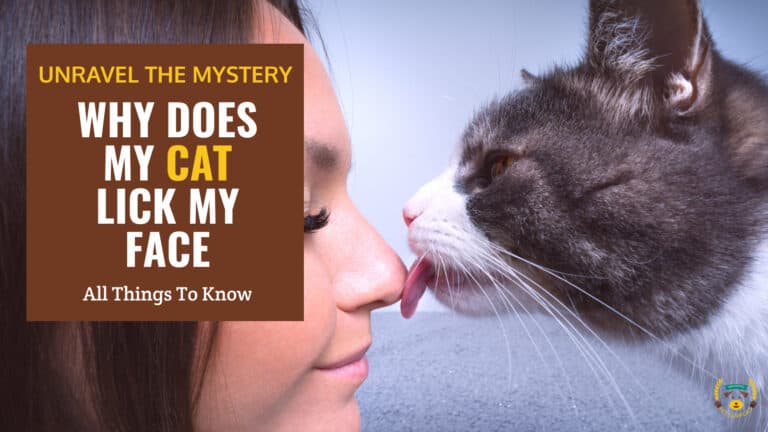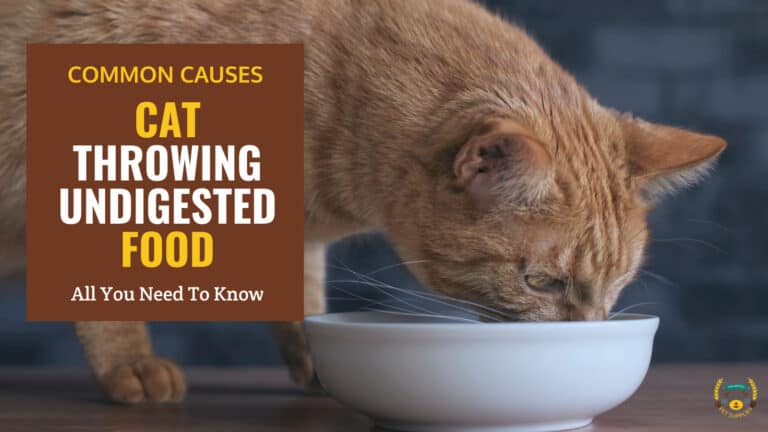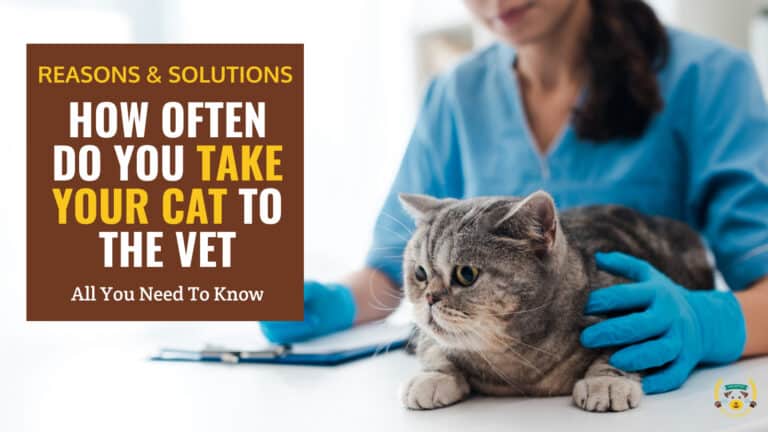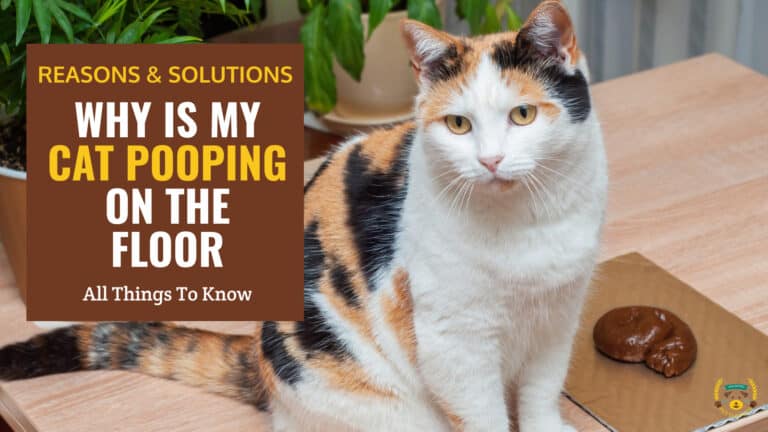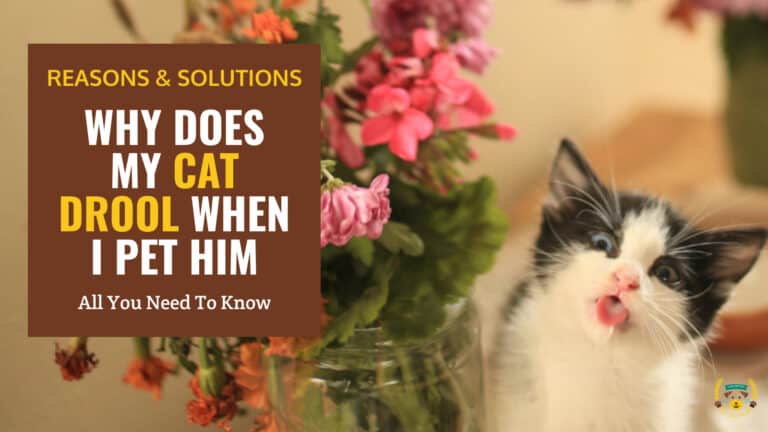Why Does My Cat Stare at Me?
Last updated: March 22, 2024
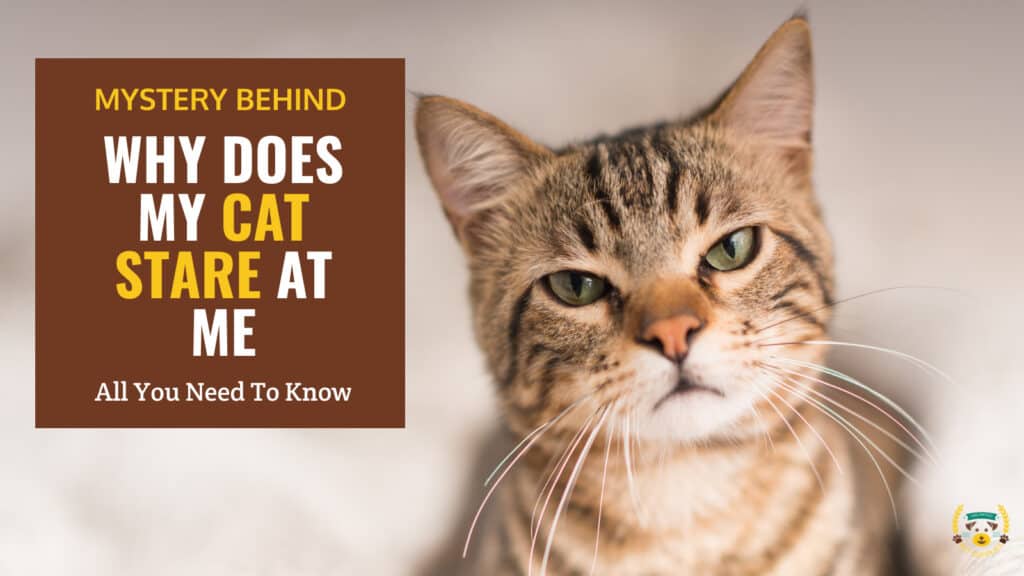
Summary
- Cats use stares to communicate affection, seek attention, show curiosity, or feel threatened.
- A slow blink with a relaxed expression means affection.
- Staring with meows or paws means attention seeking.
- Cats stare out of curiosity about your activities.
- An unblinking stare with flattened ears or a crouched posture indicates feeling threatened.
- Excessive staring can indicate health problems.
Cats have long been shrouded in an aura of mystery, their enigmatic nature captivating humans for centuries. From ancient Egyptian reverence to modern-day internet fame, these curious creatures never cease to fascinate us. One peculiar behavior that has perplexed cat owners for ages is the intense, unwavering stare.
You might find your cat's gaze following you as you move about the room, or perhaps they fix their eyes upon you during quiet moments of relaxation. This common phenomenon has led many to question the motives behind their cat's piercing stare. Is it a sign of affection, a plea for attention or something more profound?
In this article, we'll explore the world of feline communication and unravel the secrets behind your cat's mesmerizing gaze. By going through the various reasons cats stare at their owners, you'll gain a better understanding of your furry companion's behavior and strengthen the bond you share.
- 1) Understanding Cat Communication
- 2) Reasons Your Cat Stares at You
- 3) How to Respond to Your Cat's Staring?
-
4)
Frequently Asked Questions
- 4.1) Why does my cat stare at me while asleep?
- 4.2) Is it normal for my cat to stare at me for long periods?
- 4.3) Why does my cat stare at me and then look away?
- 4.4) Should I be concerned if my cat starts staring more than usual?
- 4.5) How can I tell the difference between a friendly stare and an aggressive one?
- 4.6) Do all cats stare at their owners, or is it just certain breeds?
- 4.7) Can staring be a sign of a deeper bond between a cat and its owner?
- 5) Final Thoughts
Understanding Cat Communication
Have you ever wondered how cats convey their thoughts and feelings? While they may not speak our language, cats are master communicators. They rely on a complex system of body language, vocalizations and, of course, eye contact to get their point across.
Understanding these signals can help you decipher your cat's moods and needs. For instance, have you ever wondered why your cat chooses to curl up on your lap or snuggle beside you at night? To learn more about the fascinating reasons, check out our article on why my cat sleeps on me.
The Importance of Eye Contact in Cat Communication
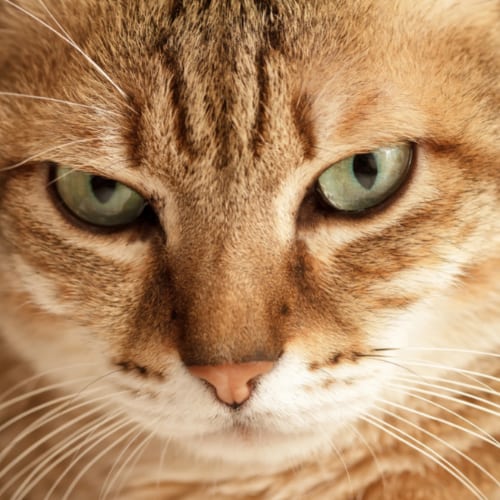
Eye contact plays a crucial role in feline communication. Cats use their eyes to express a wide range of emotions, from affection and trust to fear and aggression.
By understanding the different types of cat stares (explored in more detail below), you can gain valuable insight into your feline friend's state of mind.
Other Forms of Cat Body Language That Accompany Staring
While staring is a key component of cat communication, it's rarely the only signal your feline friend is sending.
To fully understand your cat's message, pay attention to their entire body language. A swishing tail, flattened ears or a crouched posture can provide additional context to your cat's stare, helping you decipher their intentions more accurately.
Reasons Your Cat Stares at You
Cats stare at their owners for various reasons, ranging from expressing affection to demanding attention or even indicating an underlying health issue. Let's explore the most common reasons behind your cat's captivating gaze.
Your Cat Is Trying to Communicate With You
One of the most heartwarming reasons your cat stares at you is to express their love and affection. When your cat gazes at you with a soft relaxed expression and slowly blinks, they're essentially giving you a "cat kiss." This behavior is a sign of trust and a way for your feline friend to strengthen the bond you share.
Sometimes, content cats may even drool while being petted. This doesn't necessarily mean there's a problem, but understanding the reasons behind this behavior can help you provide the best care for your furry companion.
Cats are social creatures and often crave attention from their owners. If your cat stares at you and meows or gently paws at you, they may be seeking your attention. Whether they want to play, cuddle or simply enjoy your company, a stare can be your cat's way of initiating interaction.
Also, a hungry cat is a determined cat. If your feline friend is staring at you intently, particularly near their feeding area or food bowl, they're likely trying to communicate their desire for a meal. Cats may also stare to convey other needs, such as a clean litter box or fresh water.
Your Cat Is Curious About Your Actions
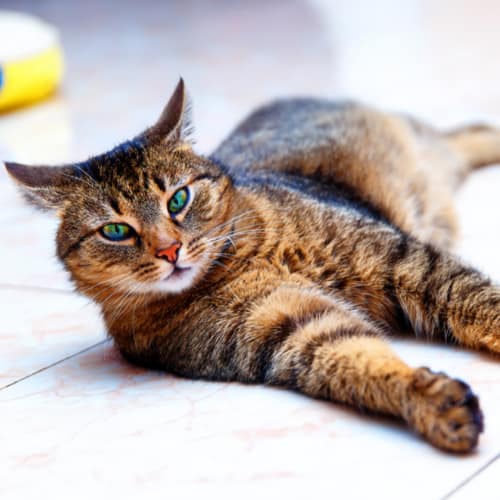
Cats are naturally curious creatures, and your daily activities can be a source of fascination for them. Whether you're working on your computer, folding laundry, or engaging in other household tasks, your cat may stare at you, intrigued by your movements and behavior.
Additionally, the sound of a can opener or the aroma of your meal can pique your cat's interest. They may stare at you while you eat or prepare food, hoping for a tasty morsel or simply curious about the process. However, it's important to resist the temptation to feed your cat from the table, as it can lead to behavioral issues and health problems. Some cats may even follow you around the house out of curiosity.
For cats who crave more mental stimulation, interactive cat toys can be a great way to keep them entertained and engaged.
As a cherished member of their family, your cat may also feel compelled to keep an eye on you as you move about the house. They may follow you from room to room, staring at you as if to ensure your safety or to stay connected to your presence.
Your Cat Is Feeling Threatened or Defensive
There are also a few less heartwarming, instinct-related reasons for a cat's stare:
Staring as a Sign of Dominance or Territoriality
In multi-cat households, staring can be a way for cats to establish dominance or claim territory. If your cat stares at another feline family member with an unblinking, intense gaze, it may be a sign of a power struggle or territorial dispute. In such cases, it's crucial to provide ample resources and space for each cat to minimize conflict.
Reacting to Perceived Threats in the Environment
Cats are highly attuned to their surroundings and may stare at a particular spot in the room if they sense a potential threat, such as an unfamiliar noise or an unexpected movement.
This behavior is an instinctive response to protect themselves and their territory.
Responding to Changes in the Household or Routine
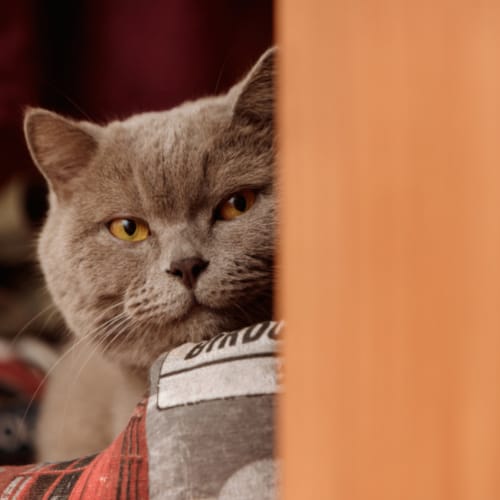
Cats thrive on consistency and can be sensitive to changes in their environment. If there have been recent changes in your household, such as a new pet, move or shift in your schedule, your cat may stare at you more frequently as they try to make sense of the new situation and seek reassurance.
Your Cat Is Experiencing Health Issues
Health problems, too, can be underlying reasons for a cat's stare.
Pain or Discomfort Causing Prolonged Staring
In some cases, excessive staring can be a sign of an underlying health problem. If your cat seems to be staring into space or at a wall for prolonged periods, it may indicate pain, discomfort or neurological issues.
Other symptoms to watch for include changes in appetite, litter box habits or general behavior.
Vision Problems or Other Sensory Changes
As cats age, they may develop vision problems or other sensory changes that affect their behavior. If your senior cat starts staring more frequently or seems disoriented, it's essential to schedule a check-up with your veterinarian to rule out any health concerns.
Cognitive Decline in Older Cats
Just like humans, cats can experience cognitive decline as they enter their golden years. If your older cat starts staring into space or appears confused, it may be a sign of feline cognitive dysfunction.
Regular veterinary check-ups and a supportive environment can help manage this condition and maintain your cat's quality of life.
How to Respond to Your Cat's Staring?
Now that you understand the various reasons behind your cat's staring, it's time to learn how to respond appropriately. Your reaction to your feline's gaze can significantly impact your relationship and their overall well-being.
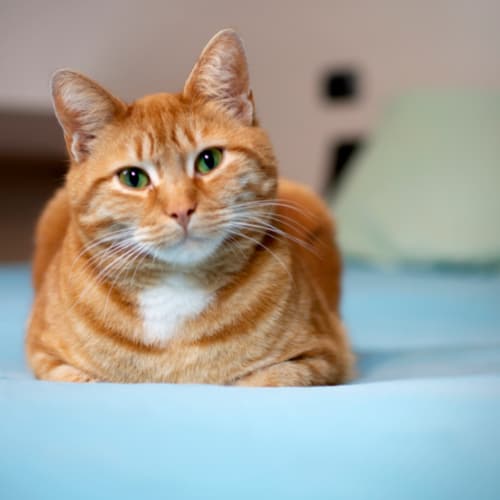
Recognizing the Context and Meaning Behind the Stare
The first step in responding to your cat's staring is to interpret the context and meaning behind their gaze.
Take note of their body language, the situation, and any recent changes in their environment or routine. By doing so, you can better understand your cat's needs and respond accordingly.
Responding Positively to Affectionate or Attention-Seeking Stares
When your cat stares at you with a soft, relaxed expression, they're likely seeking affection or attention. Here are a few ways to reciprocate their love:
Returning the Slow Blink
Slowly blinking back at your cat is a great way to show your affection. This "cat kiss" communicates that you feel safe and content in their presence, strengthening your bond.
Providing Playtime or Interaction
If your cat seems eager to play, engage them with their favorite toys or a fun game of chase.
Interactive playtime not only satisfies their need for attention but also provides mental stimulation and physical exercise.
Offering Treats or Meals
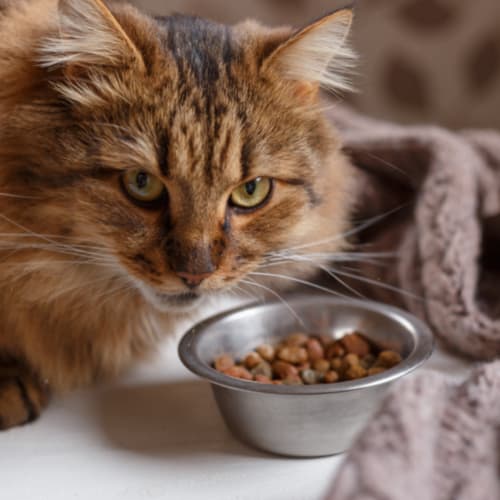
When your cat stares at you near their feeding area, it's a clear sign they're ready for a meal. Stick to a consistent feeding schedule to avoid overfeeding and maintain a healthy weight for your feline.
Addressing Defensive or Aggressive Stares
If your cat's stare seems intense or accompanied by aggressive body language, it's essential to give them space and avoid direct eye contact. Here's how to handle such situations:
Giving Your Cat Space and Avoiding Eye Contact
Staring back at an aggressive cat can be perceived as a challenge. Instead, slowly blink and turn your head to the side, showing them that you mean no harm. Give your cat plenty of space to calm down and feel secure.
Removing Potential Stressors From the Environment
Identify any potential stressors in your cat's environment, such as loud noises, unfamiliar objects, or changes in routine.
By minimizing these triggers, you can help your cat feel more at ease and reduce defensive staring.
Consulting With a Veterinarian or Animal Behaviorist
If your cat's aggressive staring persists or escalates, it's crucial to seek professional guidance.
A veterinarian can rule out any underlying health issues, while an animal behaviorist can provide targeted strategies to address the behavior.
Understanding how often cats typically need veterinary care can also be helpful. This will allow you to establish a regular vet visit schedule and ensure your cat receives the preventive care they need to stay healthy.
Monitoring Your Cat's Health and Well-Being
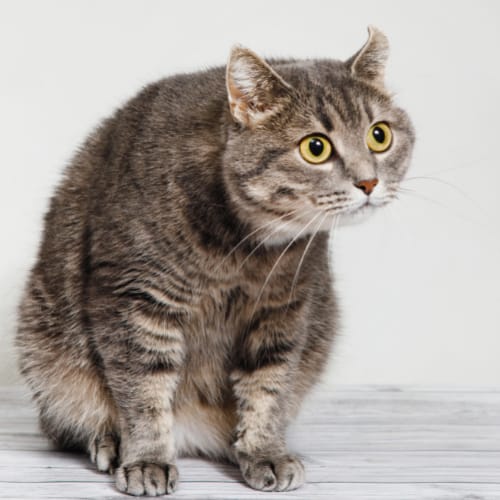
Excessive or prolonged staring can sometimes indicate an underlying health problem. To ensure your cat's well-being, consider the following:
Scheduling Regular Check-Ups With a Veterinarian
Routine veterinary check-ups can help detect health issues early on, allowing for prompt treatment and management.
Discuss any changes in your cat's staring behavior with your vet to determine if further investigation is needed.
Watching for Changes in Staring Behavior or Other Symptoms
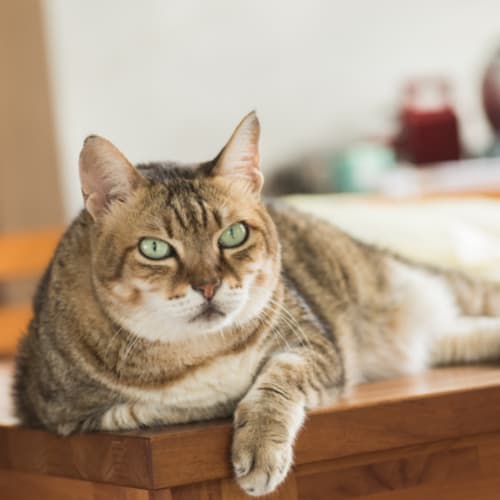
Keep an eye out for any sudden changes in your cat's staring habits, as well as other symptoms like appetite loss, lethargy or changes in litter box usage.
These may be signs of an underlying health concern that requires veterinary attention.
Providing a Comfortable and Enriching Environment for Your Cat
A stimulating and comfortable environment can go a long way in promoting your cat's overall well-being.
Provide plenty of perches, hiding spots and scratching posts to cater to your cat's natural instincts. Regularly engage them in playtime and offer a variety of toys to keep them mentally stimulated.
Frequently Asked Questions
As a cat owner, you might have many questions about your feline friend's staring habits. Here are some of the most common queries cat owners have about their pets' mysterious gaze.
Why does my cat stare at me while asleep?
Your cat may stare at you while you sleep for several reasons. They might be trying to gauge whether you're awake and ready to give them attention or food. Alternatively, your cat may find comfort in watching over you as you rest, acting as a guardian of sorts.
Is it normal for my cat to stare at me for long periods?
Yes, it's normal for cats to stare at their owners for extended periods. Cats are naturally curious creatures, and they may stare at you to observe your behavior or to communicate their needs. However, if your cat's staring is accompanied by other unusual behaviors, it's better to consult with a veterinarian.
Why does my cat stare at me and then look away?
When your cat stares at you and then looks away, they're likely engaging in a "slow blink." This behavior is a sign of affection and trust, often referred to as a "cat kiss." Your feline friend is communicating that they feel safe and content in your presence.
Should I be concerned if my cat starts staring more than usual?
If your cat's staring behavior suddenly increases or is accompanied by other changes in behavior or health, it's essential to pay attention. Excessive staring could indicate an underlying issue, such as pain, discomfort or cognitive decline.
If you notice any changes, schedule a check-up with your veterinarian.
How can I tell the difference between a friendly stare and an aggressive one?
To differentiate between a friendly and an aggressive stare, observe your cat's body language. A friendly stare is often accompanied by a relaxed posture, blinking and perhaps a gentle purr. An aggressive stare, on the other hand, involves dilated pupils, flattened ears, twitching tail, and a tense body posture.
Do all cats stare at their owners, or is it just certain breeds?
All cats, regardless of breed, may stare at their owners to some extent. However, some breeds, such as Siamese and Bengal cats, are known for being particularly communicative and engage in more prolonged eye contact with their humans.
Can staring be a sign of a deeper bond between a cat and its owner?
Yes, staring can indicate a strong bond between the cat and its owner. When your feline friend frequently seeks eye contact with you, it shows that they trust you and that you have a close connection.
Reciprocating this by engaging in slow blinks and offering treats or toys will strengthen the bond even more.
Final Thoughts
Understanding why your cat stares at you is essential for building a strong, healthy bond with your feline companion. As we have explored, cats stare for various reasons, ranging from expressing affection and seeking attention to conveying hunger or curiosity.
By learning to interpret your cat's body language and the context of their staring behavior, you can better respond to their needs and ensure their comfort and well-being.
Remember, a cat's stare is not meant to be rude or creepy; it is simply a part of their natural communication toolkit. When met with a positive, loving response, such as gentle eye contact, playtime or a well-timed treat, your cat's staring behavior can become a cherished aspect of your relationship.
If you have any questions or comments, please contact us.

